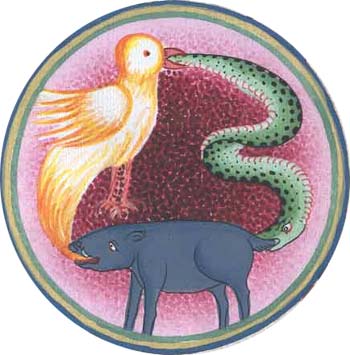(This is a companion piece to my last post.)
 Karma is antithetical to grace and mercy, and grace and mercy are at the heart of the Gospel. None of us gets everything we deserve, and sometimes the slightest effort to do good is multiplied rather than matched. But who can deny that what goes around, comes around? Which is why it’s rather fascinating how some Bible verses seem to align with the law of karma. Here’s a few of them:
Karma is antithetical to grace and mercy, and grace and mercy are at the heart of the Gospel. None of us gets everything we deserve, and sometimes the slightest effort to do good is multiplied rather than matched. But who can deny that what goes around, comes around? Which is why it’s rather fascinating how some Bible verses seem to align with the law of karma. Here’s a few of them:
A man reaps what he sows. — Gal. 6:7
For in the same way you judge others, you will be judged, and with the measure you use, it will be measured to you. — Matt. 7:2
If you set a trap for others, you will get caught in it yourself. If you roll a boulder down on others, it will crush you instead. — Prov. 26:27
…whatever good anyone does, this he will receive back from the Lord. — Eph. 6:8
Whoever sows sparingly will also reap sparingly, and whoever sows generously will also reap generously. — II Cor. 9:6
…those who plow evil and those who sow trouble reap it. — Job 4:8
Do not judge, and you will not be judged. Do not condemn, and you will not be condemned. Forgive, and you will be forgiven. Give, and it will be given to you. — Lk. 6:37-38
In fact, the greatest of all commandments (that according to Christ — Matt. 7:12), seems to invoke karma: “Treat people as you want to be treated.” Translation: Don’t act like a jerk and you won’t be treated like one.
So does the Eastern view of karma align with biblical reality? Uh, not exactly. Take for instance India’s caste system. The Encyclopedia of World Religions explains:
In general the caste system is rigidly based on heredity. One is simply born to a lifelong caste identity, as determined by karma, which directs the soul into whatever it deserves.
Thus, the Untouchables get what they deserve. But here’s the kicker: If people suffer as a result of their own bad karma, then helping them is wrong.
Remember when actress Sharon Stone suggested that the earthquake that killed at least 67,000 Chinese was the result of “bad karma”? Of course, she got reamed for those comments. Nevertheless, that’s how karma works, at least on a national scale. You support evil regimes, then expect earthquakes, tsunamis, and/or terrorist attacks.
How we treat “karma victims” is where Hinduism and Christianity radically diverge.
For if we get what we deserve, then why should we ever help anyone? If I live badly, pollute the earth, take advantage of others, and eat at Chik-fil-A, and then some evil befalls me as a result, helping me only prevents me from learning the lesson of karma! Reincarnation is the working out of bad karma. It’s why disease and poverty are so rampant in India. While many attempt to downplay it, the idea of karma is intrinsic to India’s poverty. Part of the problem, as Os Guiness summarizes, is that
Action to relieve suffering is the abortion of karma. — Os Guiness
In other words, by helping someone on the downside of the Wheel of Reincarnation, we nullify or short-circuit their karma.
This creates a conundrum for folks like Sharon Stone. By helping earthquake victims, we may raise our personal karma. But if their suffering is due to their own badness — as the law of karma suggests — then by helping them we are interrupting the natural cosmic retributive processes, thereby bringing bad karma on ourselves. That’s why the true blue Hindu leaves the old beggar to die on the streets of Calcutta — to help him would be bad karma.
If the law of karma is true, then by assisting casualties of bad karma, we hurt them and ourselves.
This is why most Westerners detach Hinduism from it spiritual roots. We cannot tolerate the logical outworking of old school karma. Sure, we’ll burn the incense, wear the jewelry, and practice yoga. But when it comes right down to it — some people are simply victims who need our help. It’s one of the many ways that the good old Judeo Christian worldview has saved Western civilization.
So, yeah, karma aligns with the Bible in some ways. But ultimately we are called to be Good Samaritans. We don’t need karma, we need mercy. And mercy is the abortion of karma.















Great post, Mike. If I had to pay for everything I did, I’d have been doomed from the beginning. I’m thankful for amazing grace!
That is an interesting conundrum. I suppose we have the same dilemma in some cases (as you pointed out in the previous blog), but since sometimes we are supposed to let people suffer. Yeshua actually caused suffering with a whip and at times allowed others to stay in positions of suffering by not healing. So is it that we are called to always help or that we are told to judge with righteous judgment? This allows both grace and discipline to exist side by side.
You may no Bob is suffering because of his wanton foolishness so you do not help him, he is allowed to suffer for God’s purposes. I do not know Bob is suffering for his own foolishness or sin, I just see a stranger suffering and do something to relieve it. I get to play grace. We’re each playing a side of God’s work (even discipline is grace). Barnabas re-accepted Mark after his flaky episode, Paul did not. Couldn’t they both have been right? Both doing what Mark needed?
So the difference to me seems to be that a karma mindset (so-applied) makes a blanket judgment without knowing the circumstance. That person is suffering therefore they deserve it.
True, Mike. And leads to, as Clark points out, to the problem of knowing when to do what.
The same could be said for atheistic evolution. Why help the least of these billions when the human race is essentially an invasive species whose virulent population explosion will be curbed naturally through massive disease and death?